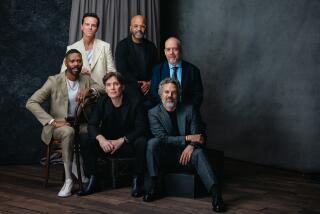Rising up to play first starring role
- Share via
PARK CITY, Utah — Peter Dinklage is sitting outside one of the larger hotels, smoking a cigarette in the afternoon sun. Sunday was the world premiere of “The Station Agent,” the first feature in which the 33-year-old actor has the starring role, and now Monday journalists and fans have come calling.
Given the film’s enthusiastic reception it’s not surprising when a group of admirers, raver types in baggy black, cluster around seeking autographs. The fans are young, teenagers, and although none stand much taller than 5’ 7” you can’t see Dinklage because he’s a good foot shorter than they are -- the most unremarkable thing about this gifted actor is that he is a dwarf.
In “The Station Agent,” Dinklage plays a loner named Finbar (“Fin”) McBride, a train aficionado who inherits a derelict railroad depot in western New Jersey. The depot, named Newfoundland, sits at the grassy edge of town so depopulated that Fin’s arrival constitutes something of an event, an unattractive proposition for a character who has spent his life inuring himself against the world’s curiosity. Almost against his will, Fin is drawn into close friendships with a painter (Patricia Clarkson), who’s grieving over the death of an only child, and a boisterous man hungry for companionship (Bobby Cannavale); against expectation, he also becomes involved with the town’s melancholic sexpot librarian (Michelle Williams).
That may make the film sound intolerably cute, even cloying, but it’s neither. Written and directed by Tom McCarthy, “The Station Agent” avoids cliche, principally by refusing to make a fetish out of either its characters’ hurt or its star’s height. In this sense, the film isn’t about a dwarf but a brooding, darkly handsome outsider who happens to be a dwarf. The wonder of the performance is that as the story evolves, Fin’s height matters less and less.
Beautifully played and often very funny, “The Station Agent” is, finally, about how people sometimes are with one another -- spiky, hurtful, emotionally careless -- rather than how many movies would like us to be. Nobody achieves closure; life just goes on, only different.
Dinklage met McCarthy about six years ago when the latter cast him in a play about P.T. Barnum in which the actor played, as he puts it with relish, “an angry Tom Thumb.” Several years ago, while the two were out drinking, McCarthy, who had been working on a piece about isolation, became struck at his friend’s facility for shutting out unwelcome attention.
“I was at a brunch with Robert Redford,” says McCarthy, “and it’s the same. Redford walks through a room and he can’t let everybody in so he gets this tunnel vision and sees you and not others. Peter’s got to do the same thing. If he let every stare in, he wouldn’t have any energy left. The character he plays is much further down that road but that was Peter’s connection to him.”
“Tom and I talked a lot about the reality of who I am as a dwarf,” says Dinklage, his cigarette extinguished and the fans dispersed. “We’d have long conversations about how to work it into the story and when not to. I’d give him feedback about situations that I’ve come across, daily situations. I talked about children and how honest they are with me, and how wonderful that is.”
“He’s a good friend,” says McCarthy, “and I didn’t want to say, ‘Tell me all your worst secrets.’ But through time we would communicate. Sometimes I would come up with an idea and say, ‘Is this happening?’ And he’d say ‘Oh, definitely, sometimes more.’ The thing about Peter, and it happens in the movie, is that people, once they break the barrier of being afraid of talking to him because he’s different, feel like they can tell him anything. They really open up with him. I think part of it is people feel they won’t be judged by someone who’s judged their whole life.”
For Dinklage, judgment sometimes comes in the form of a role. “I try to be very careful,” he says, explaining how he will turn down parts because he loves acting too much to let other people ruin it for him. That said, he isn’t interested in grandstanding or “blowing stereotypes.” If only the movies, where dwarfs are too often cast as gimmicks used for some sort of metaphor, were as generous in return.
“Somebody asked me, ‘Do you ever play characters that aren’t written for a dwarf?’ ” Dinklage pauses. “I mean, I am one. Why would I play a character that’s not? We don’t have to shove it down your throat. It’s got to be addressed but that’s what I love about Tom’s movie -- I think that it sort of disappears, hopefully. It becomes about the three of us, the friendship. Many times dwarfs or people who are different become saintly figures; they have to be these precious people to learn from.”
Suddenly, Dinklage affects a mocking stentorian voice: “ ‘I’ll guide you down the path to the pretty girl because I’m a dwarf but I’m not going to be able to get her because I’m asexual,’ you know?” He laughs. “Come on, man!”
More to Read
Only good movies
Get the Indie Focus newsletter, Mark Olsen's weekly guide to the world of cinema.
You may occasionally receive promotional content from the Los Angeles Times.










